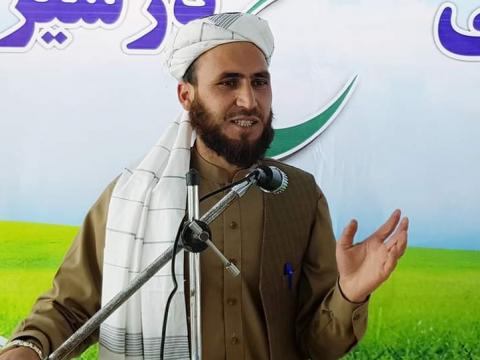Sustaining New Life: Faith Leaders Support Ending Early and Forced Marriages

Negative cultural norms tragically harm many children’s future. Exchange and child early and forced marriages (CEFM) is a common practices in western provinces of Afghanistan that has devastating effects on lives of young boys and girls. Through a community based approach, WVA seeks to use multi-pronged strategies of combined initiatives to transform attitudes and behaviors in the cultural norms while strengthening institution. A key aspect of this approach is supporting faith and community leaders to be agents of positive change through educating parents and community members on negative consequence of child marriage.
WVA established a provincial level Faith Leaders Forum on social protection comprised of members from the Department of Religious Affairs, Sharia faculty, Islamic School, religious council and the private University Union. To support the forum, Advocacy Action Networks were established at district level, with each network comprising of six members to represent their own community cases related to negative social norms.
Mohammad Ahmadi, 28, is a faith leader in Cheghcheran, Ghor. He has been engaged as part of the Faith Leaders Forum and Advocacy Action Network to promote education and end child marriage in his community. He advocates for the rights of the child and preaches against CEFM. With his learnings, he prevented a case of exchange marriage amongst his relatives.
Ten years ago, two adult brothers made an agreement to exchange and marry their children aged 9, 6, 6, and 7. After sometimes, they [brothers] decided to no longer uphold the agreement and one of the girls, Zehera, went on to marry someone else from her families approval. She was very happy however the male cousin [who she had been agreed to marry] started claiming that Zahera is under his Nekah {marriage agreement]. The situation was very serious, a violation of a social norm that could lead to serious harm or even murder for Zahera. Both families asked me [the faith leader] for mitigation and solving the case. I talked to both brothers, as leaders of the families and explained that it was wrong to marry the children and that the marriage agreement previously made is not valid. I explained that children cannot be committed to marriage as they don’t have the maturity to understand the meaning of marriage. I spent an entire day sharing lessons from a religious viewpoint and after dinner I eventually convinced them to not force the child marriage agreement. Zahera was happy for keeping her freedom to be married to someone by her choice and sustaining her new life.